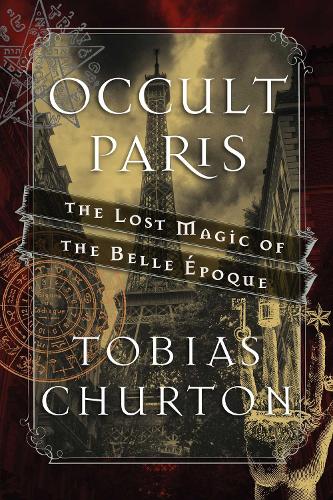
Occult Paris: The Lost Magic of the Belle poque
(Hardback)
Publishing Details
Occult Paris: The Lost Magic of the Belle poque
By (Author) Tobias Churton
Inner Traditions Bear and Company
Inner Traditions Bear and Company
3rd November 2016
United States
Classifications
General
Non Fiction
Social and cultural history
European history
130.944361
Physical Properties
Hardback
528
Width 152mm, Height 229mm, Spine 30mm
882g
Description
How fin-de-sicle Paris became the locus for the most intense revival of magical practices and doctrines since the Renaissance
Examines the remarkable lives of occult practitioners Josphin Peladan, Papus, Stanislas de Guata, Saint-Yves dAlveydre, Jules Doinel, and others
Reveals how occult activity deeply influenced many well-known cultural movements, such as Symbolism, the Decadents, modern music, and the psychedelic 60s
During Pariss Belle poque (1871-1914), many cultural movements and artistic styles flourished--Symbolism, Impressionism, Art Nouveau, the Decadents--all of which profoundly shaped modern culture. Inseparable from this cultural advancement was the explosion of occult activity taking place in the City of Light at the same time.
Exploring the magical, artistic, and intellectual world of the Belle poque, Tobias Churton shows how a wide variety of Theosophists, Rosicrucians, Martinists, Freemasons, Gnostics, and neo-Cathars called fin-de-sicle Paris home. He examines the precise interplay of occultists Josphin Peladan, Papus, Stanislas de Guata, and founder of the modern Gnostic Church Jules Doinel, along with lesser known figures such as Saint-Yves dAlveydre, Paul Sdir, Charles Barlet, Edmond Bailly, Albert Jounet, Abb Lacuria, and Lady Caithness. He reveals how the work of many masters of modern culture such as composers Claude Debussy and Erik Satie, writers Arthur Rimbaud and Charles Baudelaire, and painters Georges Seurat and Alphonse Osbert bear signs of immersion in the esoteric circles that were thriving in Paris at the time. The author demonstrates how the creative hermetic ferment that animated the City of Light in the decades leading up to World War I remains an enduring presence and powerful influence today. Where, he asks, would Aleister Crowley and all the magicians of today be without the Parisian source of so much creativity in this field
Conveying the living energy of Paris in this richly artistic period of history, Churton brings into full perspective the characters, personalities, and forces that made Paris a global magnet and which allowed later cultural movements, such as the psychedelic 60s, to rise from the ashes of post-war Europe.
Reviews
". . . a massive, focused exploration of the relationship between the mystical and the creative. . .This entertaining volume will please fans of esoterica and the City of Light." * Publishers Weekly *
With Tobias Churton as the cicerone--or dare I say psychopomp--the reader is expertly guided in the labyrinthine world of the Occult Paris of the Belle poque (1871-1914). This is the best introduction to the French occult revival ever written in English. * Henrik Bogdan, professor of religious studies at the University of Gothenburg *
Music, art, literature, mysticism--fin-de-sicle Paris had it all in great abundance, and in Tobias Churtons latest tome he uncovers the hidden and not-so-hidden connections between Satie, Debussy, Redon, Rops, Khnopff, Gauguin, Crowley, Lvi, Papus, Mathers, Pladan, Michelet, Blavatsky, Reuss, Huysmans, Breton, and countless others. . . . Eminently readable and filled with meticulous historical details, this is a fabulous depiction of one of the most exciting and fervent periods of creativity in modern times. * John Zorn, composer-performer *
A tour de force. A stunning account of fin-de-sicle Occult Paris and its lasting influence on the counterculture. . . . Churton gives comprehensive portrayals of such occult luminaries as Pladan, Papus, and de Guaita as well as a portrayal of their movements and a seminal analysis of esoteric art--in particular the Rosicrucian art of the salons--locating its place in the intellectual, cultural, and political milieu of the Belle poque. Tobias is as erudite as he is excited and exciting. His scholarship is alive with passion, imagination, humor, and, most of all, humanity. A must-read for students of European history, Art Nouveau, Symbolism, Idealism, Surrealism, and the Decadents as well as for neo-Rosicrucian, Templar and Gnostic esotericists, and modern-day alchemists and magicians. * Stephen J. King (Shiva X), Grand Master, Ordo Templi Orientis *
No one can evoke the feel of a place and an era like Tobias Churton! This is Paris in the Belle poque, but behind the city of the can-can, Toulouse-Lautrec, and the Moulin Rouge, Churton shows us a Paris of seekers in mysterious worlds--magic, Hermeticism, Kabbalah, alchemy--and of artists, writers, and composers who were also drawn to those realms. The spirit of their compelling quest is stamped on every page of this book. * Christopher McIntosh, Ph.D., author of Eliphas Lvi *
Tobias Churton brings this amazing era to life. Gnostics, Free Masons, Rosicrucians, HermeticsThe echos of Paris Belle Epoque is still heard in cultural and spiritual movements today. * The Echo *
Author Bio
Tobias Churton is Britains leading scholar of Western Esotericism, a world authority on Gnosticism, Hermeticism, and Rosicrucianism. An Honorary Fellow of Exeter University, where he is a faculty lecturer, he holds a masters degree in Theology from Brasenose College, Oxford, and is the author of many books, including Gnostic Philosophy and Aleister Crowley: The Beast in Berlin. He lives in England.
